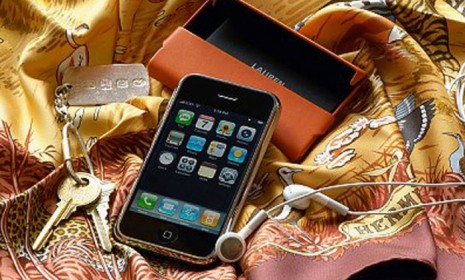Cell phones: The new credit cards?
AT&T, Verizon, and T-Mobile want you to pay for your shopping trips using your smartphone. Will you?

A free daily email with the biggest news stories of the day – and the best features from TheWeek.com
You are now subscribed
Your newsletter sign-up was successful
America's wireless giants — AT&T, Verizon, and T-Mobile — are reportedly taking on credit-card titans Visa and MasterCard, with a system that will let consumers pay with the contactless swipe of their smartphone. Visa and MasterCard aren't expected to cede customers without a fight, but can the convenience of using the ubiquitous cell phone at the cash register really overcome America's love of plastic? Here's a look at how it might work. (Watch a local report about cell phones' new use.)
How will the Verizon-AT&T venture work?
The wireless telecoms are reportedly partnering with British bank Barclays and with Discover, the No. 4 U.S. credit-card servicer, after Visa, MasterCard, and American Express. Once your Droid, iPhone, or other smartphone is equipped with a radio-frequency identification (RFID) chip, you could leave your wallet at home and pay for your purchases by waving your phone near a special receiver pad at checkout.
The Week
Escape your echo chamber. Get the facts behind the news, plus analysis from multiple perspectives.

Sign up for The Week's Free Newsletters
From our morning news briefing to a weekly Good News Newsletter, get the best of The Week delivered directly to your inbox.
From our morning news briefing to a weekly Good News Newsletter, get the best of The Week delivered directly to your inbox.
Is that safe?
If it's done right, cell phone RFID payments could be even more secure than with plastic, says Kim Eaton in Fast Company. You could, for example, use your phone's screen as a "super-secure" PIN pad, or tap your phone's other sensors to make sure nobody is stealing your money with a cloned RFID chip. Still, "RFID technology is not immune to threats," says Brennon Slattery in PC World, with RDIF viruses and "even an RFID hacking underground, in case you weren't paranoid enough."
When will this roll out?
The Verizon-AT&T venture will be tested in Atlanta and three other U.S. cities, but no time frame was given.
A free daily email with the biggest news stories of the day – and the best features from TheWeek.com
Are retailers on board?
It will require a fairly hefty up-front investment of about $200 per RFID reader. But big retailers are bullish on the technology because it could allow them to interact more with their shoppers, and because it will bring welcome competition to Visa and MasterCard, which control 82 percent of spending on general-use cards, and rope in more than $40 billion a year in transaction fees from merchants.
Can Verizon and AT&T really beat Visa?
They have a big advantage over the credit-card giants: Wireless carriers already have your bank account number as well as your phone number. And that's "definitely a game-changer," says industry consultant Richard Crone. "A mobile device is online, real-time interactivity that changes the customer relationship. A card is dumb."
Will Americans really ditch their wallets?
The industry is at a "tipping point," says Fast Company's Eaton, and U.S. consumers appear primed to embrace this decades-old technology, like consumers have in Japan, Korea, Britain, and Turkey. Bob Hedges at consulting firm Mercatus agrees, predicting that more than half of U.S. consumers — and 80 percent of those 18 to 34 — will use mobile financial services within five years. "Consumers want it to happen," he says. Whether or not this leaves Visa and MasterCard "scrambling for relevance," says PC World's Slattery, "may come down to the question of whether or not Americans trust their smartphones enough to handle" their credit cards along with all their other personal information.
Sources: Bloomberg, Fast Company, PC World
-
 Health insurance: Premiums soar as ACA subsidies end
Health insurance: Premiums soar as ACA subsidies endFeature 1.4 million people have dropped coverage
-
 Anthropic: AI triggers the ‘SaaSpocalypse’
Anthropic: AI triggers the ‘SaaSpocalypse’Feature A grim reaper for software services?
-
 NIH director Bhattacharya tapped as acting CDC head
NIH director Bhattacharya tapped as acting CDC headSpeed Read Jay Bhattacharya, a critic of the CDC’s Covid-19 response, will now lead the Centers for Disease Control and Prevention